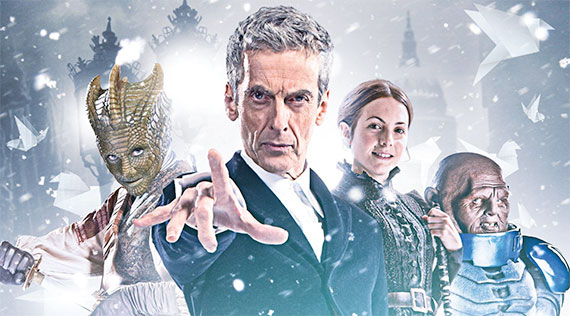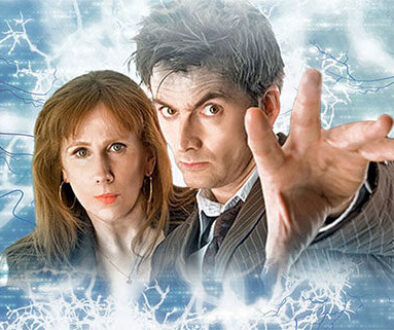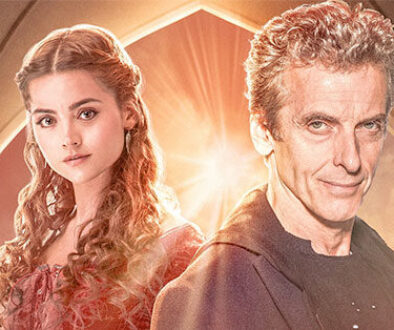Silhouette Review
Patrick Kavanagh-Sproull gives his verdict on Justin Richards’ 12th Doctor novel.

There’s no doubt that Justin Richards has Doctor Who in his blood. The man has contributed audiobooks, short stories, novels and reference books to the show’s infinite canon since the early 90s. He was one of the authors in last year’s raft of novels, delivering the rather thin Plague of the Cybermen and now he returns to be one of the first to craft a literary adventure for Peter Capaldi’s Twelfth Doctor (he is, after all, a consultant to Who fiction).
Richards has previously penned a story for the Paternoster Gang, the e-book, Devil in the Smoke, which was released shortly before the trio made a return in The Snowmen. It was a likeable, propulsive bout of adventure with spot-on characterisation for Madame Vastra, Jenny and Strax. Silhouette marks their second literary outing and Richards nails their personalities perfectly once more. Jenny is as curious and lock-savvy as the last time we saw, and Strax still casually throws out gruesome threats (though, interestingly, they are more tolerable here than on screen). Vastra is reduced to something of a cameo, retiring to Paternoster Row for a great deal of Silhouette. Richards’ choice of character prominence evokes The Crimson Horror and there are some similarities with Jenny getting plenty to do, though Strax and Clara Oswald fare somewhat better in Silhouette than they do in the aforesaid Mark Gatiss story.
Silhouette sees a spate of strange murders strike London (a concept not dissimilar to Deep Breath) as people are seemingly assassinated by shadows. One of Strax’s drinking buddies (it’s nice to see the Sontaran does have someone you could call a friend) is a victim and he sets out to avenge his comrade’s death, undertaking a solo mission without the assistance of Vastra or Jenny. Meanwhile the latter two join the investigation of a respected gent killed in a locked room. Jenny then sets off to the Frost Fairs on the Thames (perhaps coincidently mentioned by the Doctor in The Caretaker) to find out what the members of the carnival there can tell her while Vastra makes enquiries elsewhere. The Doctor and Clara materialise in Victorian London (following an argument in the TARDIS over their destination that is a near verbatim rip of Robot of Sherwood’s opening scene) as the trio’s separate investigations get underway, joining the hunt for truth. Silhouette is, overall, a fairly simple tale well told but with a simple resolution (as is Richards’ wont).
 Silhouette is similar to The Blood Cell in that the villain is somewhat hazy for a large part of the story. Like James Goss after him Richards keeps you on tenterhooks, eager to find out what the result of the story is. Richards’ villain is a sardonic, eloquent character that’s unexpectedly polite. A lot of the time you find antagonists in Doctor Who that are straight up charming to the Doctor (it certainly makes better television when the hero and the villain have a proper conversation) and Richards’ nemesis here is written in the same vein. However, there’s one caveat: it’s not a façade. The baddie here is always well mannered even when Silhouette enters its third act. It’s bizarre and fairly strange to see a courteous villain that doesn’t use their civility as a veil.
Silhouette is similar to The Blood Cell in that the villain is somewhat hazy for a large part of the story. Like James Goss after him Richards keeps you on tenterhooks, eager to find out what the result of the story is. Richards’ villain is a sardonic, eloquent character that’s unexpectedly polite. A lot of the time you find antagonists in Doctor Who that are straight up charming to the Doctor (it certainly makes better television when the hero and the villain have a proper conversation) and Richards’ nemesis here is written in the same vein. However, there’s one caveat: it’s not a façade. The baddie here is always well mannered even when Silhouette enters its third act. It’s bizarre and fairly strange to see a courteous villain that doesn’t use their civility as a veil.
It’s unfortunate that Silhouette has such a simple story because a complex plot could have helped draw attention from another shortfall: the Doctor and Clara’s characterisation. Both are written incredibly generically. It’s understandable that the three writers for the Twelfth Doctor’s first few novels will struggle with the characterisation but Richards does not find the voice of the new Doctor at any point. There are a few lines that sing with Capaldi’s voice but generally Silhouette features a bland, relatively dull Doctor. I feel like Richards didn’t estimate just how mean and eye-rollingly abrasive the Twelfth Doctor would be (although, surely, it was evident in the scripts provided for Richards?) so this is just his extremely mild interpretation of the character. After The Blood Cell I had such high expectations for Clara but, largely, she’s there to be “the asking questions one” and little more. There are more occasions for her than the Doctor where you see Jenna Coleman shine through the text, particularly in Clara’s sassier lines but for most of the time she falls into the stock companion role. Interestingly enough, Richards’ novel is the book with the least amount of references to series 8 as Mike Tucker’s The Crawling Terror featured Clara thinking back to her life at Coal Hill School and Danny Pink, likewise The Blood Cell by James Goss.
Verdict: 5/10
Richards has written so much for Doctor Who that, at times, his stories can be pretty standard (although there are plenty of diamonds in the rough in Richards’ back-catalogue). Much like Plague of the Cybermen (albeit better) Silhouette is a solid adventure but nothing particularly special. There are some terrific action moments (look out for one in which Clara ventures into a disused warehouse alone) and the tension is ratcheted up towards the end (Silhouette, thankfully, does not have any of the pacing issues its counterparts did) but concludes with a pretty disappointing climax. The villain is wickedly charming (more, downright charming with less of the wicked) and the Paternoster Gang are well drawn. However, the Doctor and Clara are flat imitations of their screen equivalents and there are next to no references to the current series, which can help assure both authenticity and the reader in identifying the protagonists.








